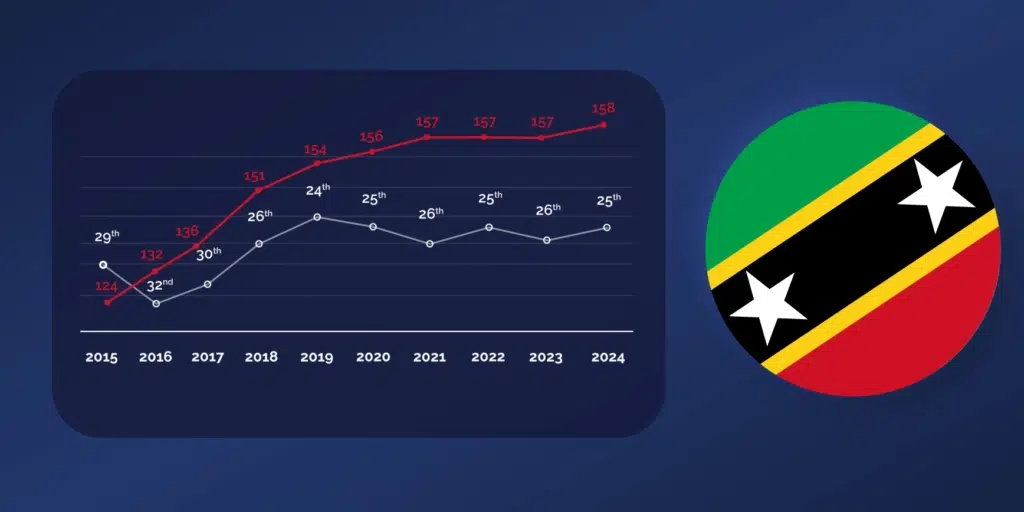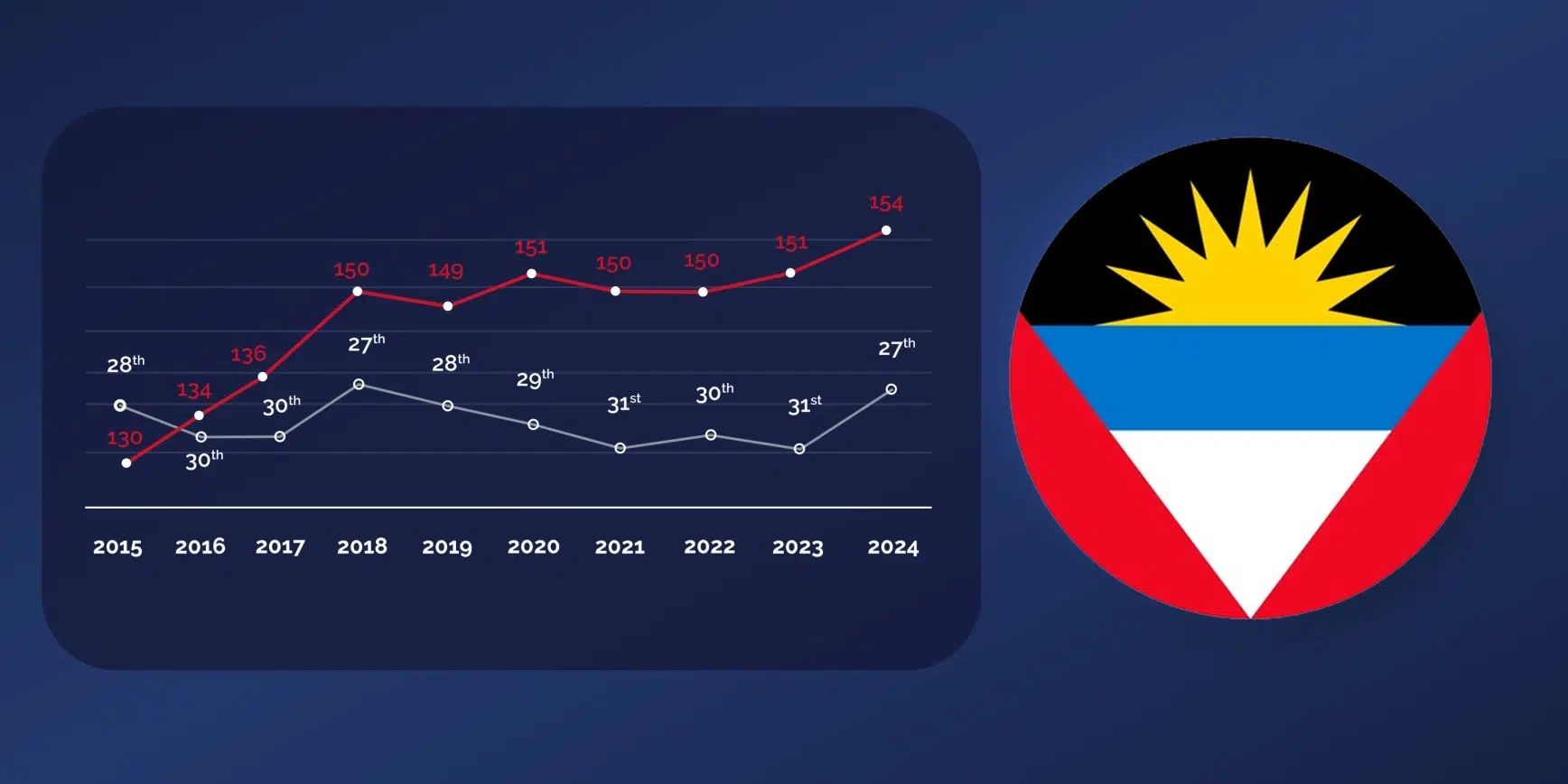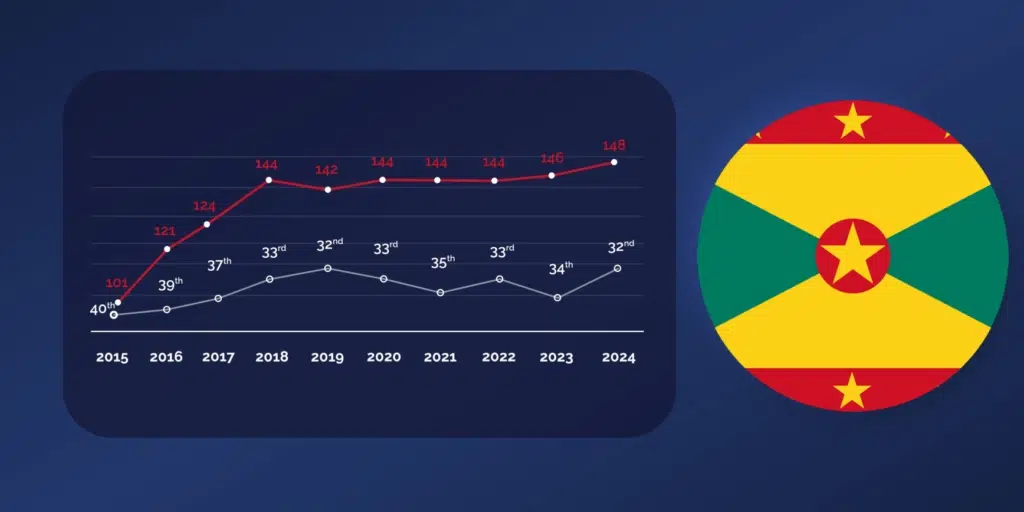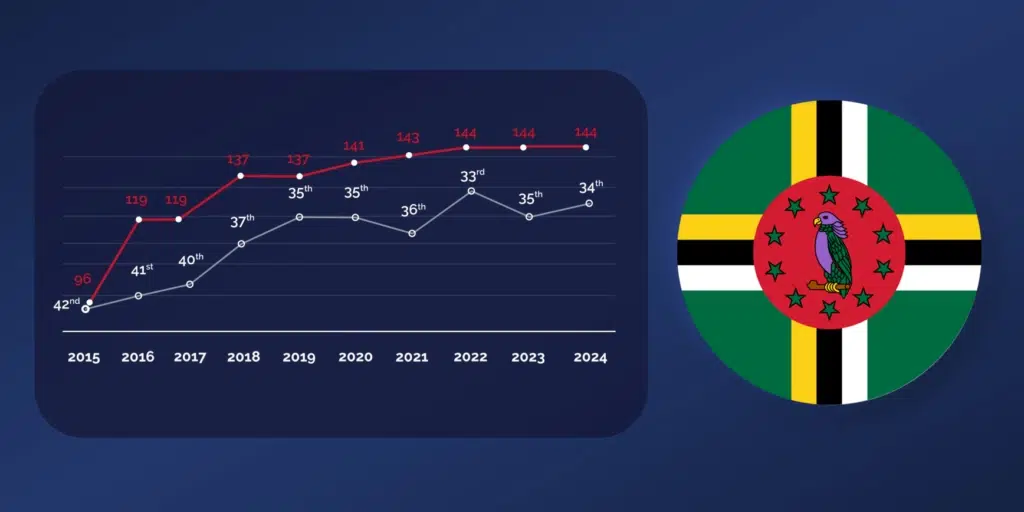This notable improvement achieved over the past ten years proves the importance of their positions and relations with other countries and reflects the high mobility and freedom they provide to their holders.
In this article, we will show the growth each country’s passport has achieved over the past ten years and delve into these countries’ economic and diplomatic relations with the EU.
Evolution of Caribbean CitizenshipPrograms Over the Past 10 Years
Saint Kitts and Nevis Passport Rankings: Leading Caribbean Countries

The passport of Saint Kitts and Nevis has seen a great leap over the past decade, rising from 29th place in 2015 to 25th place in 2024, achieving first place among Caribbean passports. It is considered one of the most desirable passports as it gives its holder visa-free access to 157 destinations, including the UK, Schengen Area, Russia, Hong Kong, Singapore, and Latin American countries.
The number of countries that passport holders can enter without a visa has increased by an average of 3 countries per year. Recently, Kazakhstan and Saudi Arabia were added to the list.
Saint Kitts and Nevis has signed an agreement with Europe in 2009 to provide visa-free travel and stay for their citizens for a maximum of 3 months for 6 months.
The country enjoys strong diplomatic relations with many European countries, including the UK, France, Germany, and Spain. To follow the principles, set by the EU for Caribbean CIPs, the nation has doubled its minimum donation threshold from $125,000 to $250,000 and its real estate from $200,000 to $400,000.
St. Kitts has also made it mandatory for all applicants to undergo an interview with the Citizenship by Investment Unit (CIU) or an independent professional firm commissioned by it. The CIU said it would commission independent professional firms in the UK, US, and Europe to conduct vetting and due diligence on all its applicants.
St. Kitts and Nevis is actively working to expand its international influence and boost its economy by aiming to join La Francophonie, demonstrating a commitment to strengthening global ties and fostering economic development. La Francophonie is a prestigious group of 88 states and member governments, including observers, that share French as a common language and uphold shared values[1].
Antigua and Barbuda: Exceptional mobility

Antigua and Barbuda\’s passports have shown remarkable improvement, climbing from 28th place in 2015 to 27th place in 2024. It is highly coveted for its exceptional mobility, offering visa-free access or visa upon arrival to 154 destinations this year, marking an impressive 18.5% increase from 130 countries in 2015. Recently, the country achieved a significant milestone by adding China to its list.
Antigua and Barbuda signed an agreement with the European community on the short-stay visa waiver in 2009.
In October 2014, the EU Council authorized the opening of negotiations for amending the short-stay visa waiver agreement between both countries by initialing the new agreement in October 2016.
Antigua and Barbuda also maintain a high level of diplomatic relations with regional partners, including the UK and EU member states, and are actively engaged in international organizations.
The country\’s policy is based on the principles of good neighborliness and mutual respect, focusing primarily on obtaining international economic assistance and ensuring effective economic cooperation.
Antigua and Barbuda’s citizenship-by-investment program is also renowned as an affordable option for large families. It stands out as the only citizenship program that allows unmarried siblings to be included in a single application regardless of their age, ensuring that everyone can enjoy the benefits of this captivating nation.
Grenada: Robust relationships

Grenada\’s passport has made significant strides, rising from 40th place in 2015 to 32nd place in 2024. The number of destinations that its passport holders can access without a visa has increased from 101 countries in 2015 to 148 countries in 2024, marking a 46.5% increase.
Grenada’s passport holders have instant travel opportunities to worldwide prime destinations, including Singapore, the United Kingdom, Russia, China, and the entire European Union.
Grenada has a strong relationship with the European Union. For example, in 2013, it signed a Comprehensive Economic Partnership Agreement with the EU to enhance trade and investment between the two parties.
Grenada and the EU work together through three key partnerships, respectively focusing on “Green Deal”, “Economic Resilience and Trade” as well as “Governance, Security and Human Development”. Additionally, Grenada enjoys strong external relations with China and the United States, with which it signed an E-2 visa treaty.
Saint Lucia: 56% increase in ten years

Saint Lucia\’s passport has undergone remarkable development, advancing from 37th place in 2015 to 32nd place in 2024. Regarded as highly desirable, it grants holders visa-free or visa-on-arrival access to 148 destinations, including the UK, Schengen Area, Russia, Hong Kong, Singapore, and various Latin American countries. This marks a significant increase from 95 countries in 2015, reflecting 55.8% growth.
Saint Lucia maintains friendly relations with the European Union. In April 2015, Saint Lucia signed an agreement[2] with the European Community to provide visa-free access for the citizens of the Union and for the citizens of St. Lucia when traveling to the territory for a maximum period of 90 days in any 180 days.
Dominica: Remarkable improvement

Dominica\’s passport has shown significant advancement, climbing from 42nd place in 2015 to 34th place in 2024. It now offers visa-free access to 145 countries, up from 95 countries in 2015, representing a 49.9% increase.
Dominican passport holders can enter countries like Singapore, Russia, and the entire European Union without a visa, enabling immediate access to top-tier destinations.
Dominica has a strong relationship with the European Union. The two held a country portfolio review meeting[3] last year to review projects being undertaken in Dominica as well as decide on new projects for the upcoming years.
They are reviewing the progress and what has been done over the years, while at the same time looking at the obstacles and challenges and finding solutions for them.
Agreements with EU
Historically, the Caribbean countries were European colonies for several centuries, and this era has had a profound impact on the relationship between the Caribbean countries and Europe and the UK.
Economically, the Caribbean countries provide crucial resources for Europe and the UK and are major tourist destinations for their citizens, as well as an important market for their products. Europe and the UK also invest heavily in the Caribbean countries, especially in the tourism and agriculture sectors.
In October 2008, Caribbean countries[4], including Antigua and Barbuda, Dominica, Grenada, Saint Lucia, and Saint Kitts and Nevis, signed the CARIFORUM-EU Economic Partnership Agreement with the EU.
The EU is CARIFORUM\’s third-largest trading partner, after the US. The main exports from the Caribbean to the EU are fuel and mining products, notably petroleum gas and oils, bananas, sugar and rum, minerals , iron ore products, and other. The main imports into the Caribbean from the EU are boats, ships, cars, construction vehicles and engine parts, phone equipment, milk and cream, and spirit drinks.
The Economic Partnership Agreement (EPA) helps the two regions invest and trade with each other, provides predictable EU market access for these countries, and gradually opens the EU market for services, including the creative and entertainment industries. It also ensures duty-free, quota-free market access into the EU for all products and ensures EU exports of sensitive products will gradually be liberalised over a period of 25 years.
It also makes it possible for CARIFORUM companies to set up a commercial presence in the EU. The EPA includes a free trade agreement (FTA), which opens trade in goods between the two regions. Unlike other FTAs, the EPA helps their development through trade, opening up trade in services and investment, making it easier to do business in the Caribbean, and setting rules to ensure fair competition.
Diplomatically, the Caribbean countries enjoy close diplomatic relations with Europe and the UK. The two parties cooperate in many areas, such as economic development, poverty alleviation, climate change, security, and others. Geographically, the Caribbean countries are located in a strategic area at the crossroads between North and South America and Europe.
[1] https://www.sknis.gov.kn/2023/12/28/st-kitts-and-nevis-pursues-enhanced-global-presence-by-seeking-membership-in-la-francophonie/
[2] https://data.consilium.europa.eu/doc/document/ST-7107-2015-INIT/en/pdf
[3] http://www.news.gov.dm/news/2615-dominica-and-eu-discuss-the-way-forward
[4] https://policy.trade.ec.europa.eu/eu-trade-relationships-country-and-region/countries-and-regions/caribbean_en

